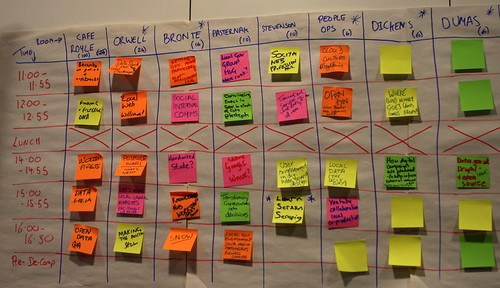As a follow up to my post on the UK .gov blogosphere, a small session was run at the recent govcamp on the state of blogging in the public sector in the UK.
The discussion was an interesting one and Al Reid took down some great notes that cover most of what was said. Pubstrat wrote a great post before the event which summed up most of the stuff we talked about anyway.
Here’s my take: I was wrong to mention blogs. A lot of the resultant discussion in the comments of that post and other chats have focused on blogging, which is of course just the medium. It’s the content I am interested in.
What we seem to lack is an ecosystem of ideas in public services. Discussions about new ways of doing things, how to change the way things are, how ideas get progressed into prototypes and then into actual delivered services or ways of working. Whether this happens on a blog, in a social network, on a wiki or over a cup of tea is neither here nor there.
This ties in with the discussion sparked by Dom on Twitter about the lack of challenge in evidence at the govcamp, and that it was a pretty homogenous group of people in attendance. The question was posed, how do we get everyone else to these events, or at least having these sorts of conversations?
I’ve no idea, frankly.
I believe a couple of things are pretty evident though:
- Government at all levels has to improve its attitiude to ideas and thus to innovation
- Structures and processes will help the behaviour required for an ideas ecosystem become embedded and accepted
- People within organisations have to start getting better at talking to each other for any of this to actually work
The unconference format works very nicely in providing the space for people to have conversations about stuff. The blank canvas that is the agenda can be daunting, but with the right preparation, everyone can arrive at the event primed and ready to say things. I’m having chats with Jeremy and others about how this might be applied to individual organisations. Watch this space.
All of this ties in with what I started to think about in several post over the last couple of months, which seems to be coalescing in my mind around the notion of learning organisations – familiar to anyone that has read the work of Peter Senge but which for me focuses on the ability for organisations to have meaningful conversations, both internally and externally, and to have a grown up attitude to change and new ideas.
I’ll be talking about this on Thursday at the Cllr.10 event, with some focus on the shift in leadership that this stuff necessitates.
Also worth reading around these ideas is the work Lloyd Davis is doing, as social artist in residence at the Centre for Creative Collaboration. David Wilcox has covered social artistry before too. I’m not sure we’ll ever see civil servants or local government officers with that job title anytime soon, but the skills of convening and facilitation are vital for anyone who wants to succeed within a learning organisation.
The web is fundamental to the development of this thinking and the conversations around it. Firstly, because the web is the domain where the ideas are being kicked about and refined. Secondly, because these ideas are the by-products of using the web and social tools. As I keep saying these days, what makes social software interesting is not the software, but the implications of using it.



